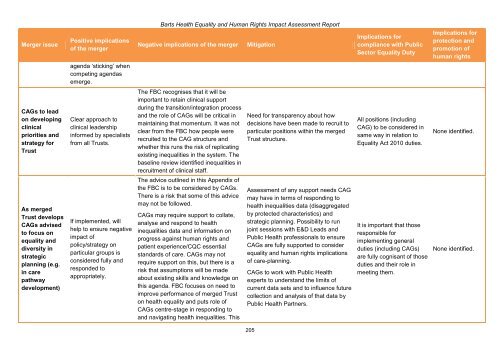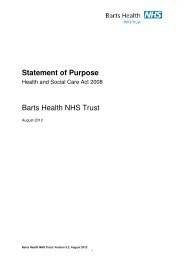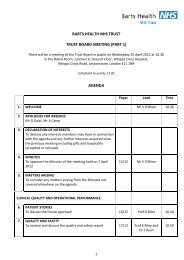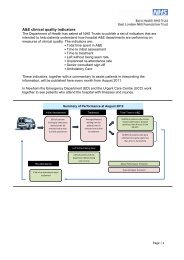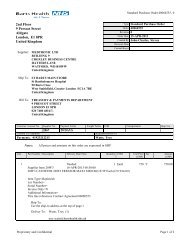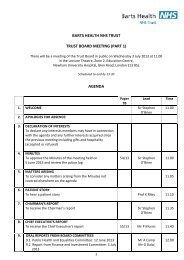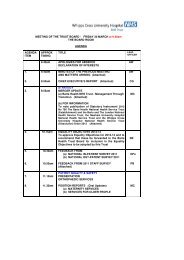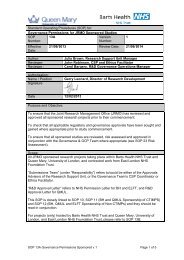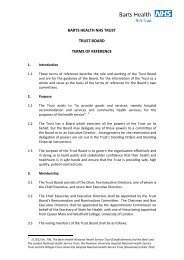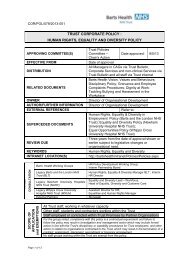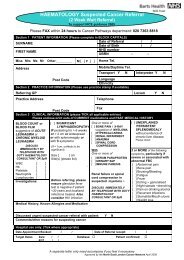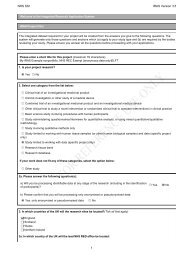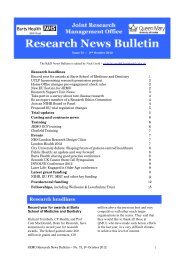Barts Health Equality and Human Rights Impact Assessment Report
Barts Health Equality and Human Rights Impact Assessment Report
Barts Health Equality and Human Rights Impact Assessment Report
- No tags were found...
Create successful ePaper yourself
Turn your PDF publications into a flip-book with our unique Google optimized e-Paper software.
Merger issuePositive implicationsof the merger<strong>Barts</strong> <strong>Health</strong> <strong>Equality</strong> <strong>and</strong> <strong>Human</strong> <strong>Rights</strong> <strong>Impact</strong> <strong>Assessment</strong> <strong>Report</strong>Negative implications of the mergerMitigationImplications forcompliance with PublicSector <strong>Equality</strong> DutyImplications forprotection <strong>and</strong>promotion ofhuman rightsagenda ‘sticking’ whencompeting agendasemerge.CAGs to leadon developingclinicalpriorities <strong>and</strong>strategy forTrustClear approach toclinical leadershipinformed by specialistsfrom all Trusts.The FBC recognises that it will beimportant to retain clinical supportduring the transition/integration process<strong>and</strong> the role of CAGs will be critical inmaintaining that momentum. It was notclear from the FBC how people wererecruited to the CAG structure <strong>and</strong>whether this runs the risk of replicatingexisting inequalities in the system. Thebaseline review identified inequalities inrecruitment of clinical staff.Need for transparency about howdecisions have been made to recruit toparticular positions within the mergedTrust structure.All positions (includingCAG) to be considered insame way in relation to<strong>Equality</strong> Act 2010 duties.None identified.As mergedTrust developsCAGs advisedto focus onequality <strong>and</strong>diversity instrategicplanning (e.g.in carepathwaydevelopment)If implemented, willhelp to ensure negativeimpact ofpolicy/strategy onparticular groups isconsidered fully <strong>and</strong>responded toappropriately.The advice outlined in this Appendix ofthe FBC is to be considered by CAGs.There is a risk that some of this advicemay not be followed.CAGs may require support to collate,analyse <strong>and</strong> respond to healthinequalities data <strong>and</strong> information onprogress against human rights <strong>and</strong>patient experience/CQC essentialst<strong>and</strong>ards of care. CAGs may notrequire support on this, but there is arisk that assumptions will be madeabout existing skills <strong>and</strong> knowledge onthis agenda. FBC focuses on need toimprove performance of merged Truston health equality <strong>and</strong> puts role ofCAGs centre-stage in responding to<strong>and</strong> navigating health inequalities. This<strong>Assessment</strong> of any support needs CAGmay have in terms of responding tohealth inequalities data (disaggregatedby protected characteristics) <strong>and</strong>strategic planning. Possibility to runjoint sessions with E&D Leads <strong>and</strong>Public <strong>Health</strong> professionals to ensureCAGs are fully supported to considerequality <strong>and</strong> human rights implicationsof care-planning.CAGs to work with Public <strong>Health</strong>experts to underst<strong>and</strong> the limits ofcurrent data sets <strong>and</strong> to influence futurecollection <strong>and</strong> analysis of that data byPublic <strong>Health</strong> Partners.It is important that thoseresponsible forimplementing generalduties (including CAGs)are fully cognisant of thoseduties <strong>and</strong> their role inmeeting them.None identified.205


